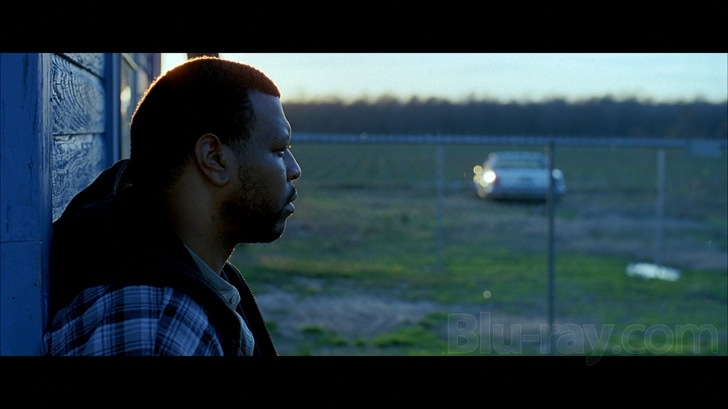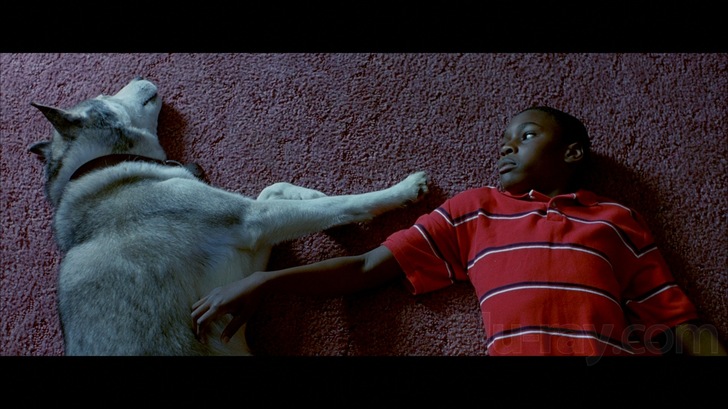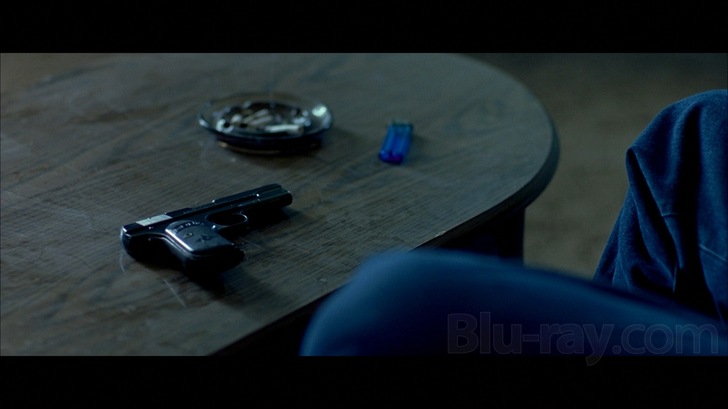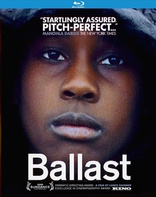Ballast Blu-ray Movie
HomeBallast Blu-ray Movie 
Kino Lorber | 2008 | 96 min | Not rated | Nov 10, 2009Movie rating
7.1 | / 10 |
Blu-ray rating
| Users | 0.0 | |
| Reviewer | 4.0 | |
| Overall | 4.0 |
Overview
Ballast (2008)
In the Mississippi Delta, a mother and her 12-year-old son try desperately to escape the poverty that rules the region. But their efforts are confounded when the boy's attempts to win the favor of his fellow teens lead him into a dangerous situation with a lonely and broken man
Starring: Michael J. Smith, Sr., Jim Myron Ross, Tarra RiggsDirector: Lance Hammer
| Drama | 100% |
Specifications
Video
Video codec: MPEG-4 AVC
Video resolution: 1080p
Aspect ratio: 2.35:1
Original aspect ratio: 2.39:1
Audio
English: Dolby TrueHD 5.1 (48kHz, 16-bit)
Subtitles
English, French, Spanish
Discs
25GB Blu-ray Disc
Single disc (1 BD)
Playback
Region free
Review
Rating summary
| Movie | 4.5 | |
| Video | 4.0 | |
| Audio | 4.0 | |
| Extras | 1.5 | |
| Overall | 4.0 |
Ballast Blu-ray Movie Review
“He’s gonna try it again.”
Reviewed by Casey Broadwater November 11, 2009“Heavy material carried in the hold of a ship, especially one that has no cargo,” is how one dictionary defines ballast, and this is a perfect metaphor for the heavy material carried in the otherwise empty souls of the three characters who inhabit the bleak world of director Lance Hammer’s stark and elegiac theatrical debut. There’s a lot of heaviness in Ballast—dense anger and compacted resentment, leaden sorrow and calcified regret. And yet, there are also moments of transcendence, of utter profundity and aching truth. It’s rare to see a debut film so aesthetically assured and thematically inclusive.

Michael J. Smith, Sr.
When the narrative begins, Darrius has already killed himself with a sleeping pill overdose. As his body lies in unsettling repose, his identical twin Lawrence (Michael J. Smith, Sr.) sits in shock in an adjacent room, having made this grim discovery an undisclosed time before. A neighbor comes to the door to check in. The convenience store the brothers own has been closed for a few days; he just wants to make sure everything is okay. He smells the body; obviously it’s been awhile. When the neighbor calls 9-1-1 to report Darrius’ death, Lawrence stoically walks next door to his own home. We hear—but do not see—a gunshot. The effect is startling.
Lawrence survives, and these dual tragedies—his brother’s death and his own suicide attempt— are the catalyst for a familial drama years in the making. Darrius has left behind a widow, Marlee (Tarra Riggs), but it’s been some eleven years since the two were last together. For some initially undisclosed reason, Darrius had left her, and in return, she placed a restraining order against him, forbidding him to see their son, James (JimMyron Ross), who is now twelve years old. The relationships and history between the four characters—the living, and the dead Darrius—are slowly but inexorably unearthed. There’s no needless exposition, no gratuitous flashbacks or voice-over narration. Instead, we’re left to largely fill in the blanks for ourselves, piecing together, through snatches of dialogue, the unspoken mutual resentment that has festered between Marlee and Lawrence for over a decade, and which they are now forced to confront. Marlee is poor and newly unemployed, trying her best to raise a son who desperately needs a father. And Lawrence is bereft, constantly on the verge of another suicide attempt. Feeling the pangs of his brother’s death like the throbbings of a phantom limb—he remarks that they shared a single soul —Lawrence is unsure how to proceed alone into the world. These three people obviously need one another, but the past endlessly complicates the present, and Ballast is unwilling to present easy solutions to the most difficult problems of these characters’ lives.
This is an artful, literary film, with a naturalistic narrative and a cinematic aesthetic to match. The hand-held cinematography by Lol Crawley gives us unrelenting access into the lives of the characters and their surroundings. The film takes place during a drab, sunless winter on a desolate stretch of the Mississippi Delta, which, though it seems cliché to say, truly becomes the film’s fourth character. Like Terrance Malick, director Lance Hammer dwells on place and poeticizes the landscape, casting his lens on the barren fields, the burned out forests of skeletal trees, the joyless houses and all the visual cues of rural poverty. When a train passes through, it’s going somewhere, somewhere our characters are never likely to go. In the film’s opening shot, James watches a flock of squalling, migratory birds take flight from the marsh next to his house. They can fly away; he can’t. The symbolism is heartrending but completely organic, never forced.
In fact, there’s not a false moment here, emotionally, in terms of narrative, or otherwise. The pacing is thoughtful but never sluggish, and the complete absence of a score means that every feeling the film raises is natural, unaided by the emotional prodding for which music is usually used. None of this would be possible without the performances, which are uniformly excellent, realistic and affecting. The three novice actors were given two full months of rehearsal, which included a lot of improvisational conflict exercises, some of which are included in the special features on this disc. I really can’t stress enough how natural and fluid the acting is here, particularly from Michael J. Smith and Tarra Riggs, whose unfolding arguments truly feel burdened by the history of their characters. The ending of the film is ambiguous—perfectly so— but I sense some optimism. Maybe I was wrong when I claimed, in my introduction, that the ballast of the title was the emotional bagged lugged around by the protagonists. Perhaps the real ballast—the thing that keeps them upright—is one another.
Ballast Blu-ray Movie, Video Quality 

Kino International has given Ballast a weighty appearance on Blu-ray, offering up a 1080p/AVC-encoded transfer that well represents the film's stark and austere imagery. I'm admittedly in love with the cinematography here—it's coldly perceptive, with depth and beautiful use of focus—and I'm happy to note that this transfer from 35mm to high definition never hampers the film with any technical shortcomings. My only real complaint—and this is a source issue—is that white specks are occasionally visible on the print. It's never to the point of distraction, but they are noticeable. In all other ways, this is a solid presentation; it's not as crisp or clean as the latest big-budget extravaganza, but the film's intentions are aptly met. As you can tell from the screenshots, almost the entire film is cloaked in somber bluish-grey tones. Even if they aren't vivid, the colors here have a depth and presence, never appearing washed out or unstable. There are exceptions—James' red polo shirt is extremely bright and saturated in comparison, which I have to think is intentional. Black levels too are strong, and while there is a bit of crush, this is part of the visual aesthetic of the film, which predominately relies on natural light sources and deep shadow. Clarity is astute, especially for a film shot almost entirely hand- held. Fine facial detail is easily discernable, and the surrounding rural wasteland is keenly resolved. Grain can get a bit heavy during some of the darker scenes, but it has an organic quality that suits the nature of the film.
Ballast Blu-ray Movie, Audio Quality 

There's only one instance of music in Ballast—a jukebox plays a tune while Lawrence is sitting in a bar. This lasts for about three seconds. There's no score, no strings to cue our sentiments or pounding rhythms to drive the tension. Like No Country For Old Men, the soundscape here is completely natural, built upon airy ambience, the crunch of gravel underfoot, the slamming of a car door, and the various mundane sounds of a mundane life. While not quite as detailed and immersive as the Coen brothers' classic, Ballast's Dolby TrueHD 5.1 surround track pairs perfectly with its bleak visuals. Sounds are clean and weighted and resonate with the appropriate acoustics. The rear channels frequently broadcast an outdoorsy hush; wind blowing softly, crickets singing in the evening, a car passing somewhere in the distance. When the train roars past, we even get some deep LFE rumbling. Dialogue is mostly clean and comprehensible. I say mostly because JimMyron Ross mutters occasionally and it's sometimes difficult to make out what he's saying. The other leads are clearly understood throughout. In general, the mix is balanced and the sound editing is excellent, using naturally occurring noises to emotional effect.
Ballast Blu-ray Movie, Special Features and Extras 

Making Of: Scene Development (1080p, 37:45)
After watching Ballast, I really wished the director had opted to do a commentary. The
film
does speak for itself, but I'd love some insight into Lance Hammer's inspirations and influences,
or
even just a few words on how he arrived at the film's visual aesthetic. While a commentary is
sadly
missing, we do get these rehearsal tapes, which show the actors practicing specific scenes, as well
as engaging in some improvised verbal conflict that expands upon their characters. Do note that
while this plays in 1080p—to allow finished clips from the film to be shown in full quality—the
rehearsal tapes themselves are upscaled from standard definition video.
Theatrical Trailer (1080p, 1:39)
Ballast Blu-ray Movie, Overall Score and Recommendation 

Ballast is a bold debut from writer and director Lance Hammer, a film that, in its artistry and intuition, feels like it could've come from one of the great auteurs of the 1970s. It's not for all tastes—this is, in some ways, a deeply sad film—but if you're looking for some honest, serious- minded cinema, Ballast is an excellent choice. Kino International—who also released Buster Keaton's The General this week—delivers a strong presentation here as well, with a lossless TrueHD audio track and a director-supervised 1080p transfer from the film's 35mm interpositive. Highly recommended.
Similar titles
Similar titles you might also like

Norma Rae
35th Anniversary Edition
1979

Tetro
2009

This Must Be the Place
2011

Pather Panchali 4K
পথের পাঁচালী / Song of the Little Road
1955

The Banishment
Izgnanie
2007

Out of the Blue 4K
1980

Bodies, Rest & Motion
1993

The Skin Game
1931

Certain Women
2016

All or Nothing
2002

Le Quattro Volte
2010

Elena
Елена
2011

Wildlife
2018

Minari
2020

A Month in the Country
Limited Edition to 3000
1987

George Washington
2000

Heaven Knows What
2014

The Servant
1963

Mildred Pierce
2011

Modern Times
1936
